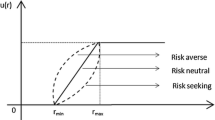Abstract
We face the problem of constructing a model which is suited for an effective evaluation of the quality of a health-care provider: to this purpose, we focus on some relevant indicators characterizing the various services run by the provider. We rely on a fuzzy modeling approach by using the interpretation (in terms of coherent conditional probability) of a membership function of a fuzzy set as a suitable likelihood.
Preview
Unable to display preview. Download preview PDF.
Similar content being viewed by others
References
Berwick, D.M.: Continuous improvement as an ideal in health care. The New England Journal of Medicine 320, 53–56 (1989)
Bouchon–Meunier, B., Rifqi, M., Bothorel, S.: Toward general measures of comparison of objects. Fuzzy Sets and Systems 84, 143–153 (1996)
Coletti, G., Scozzafava, R.: Characterization of Coherent Conditional Probabilities as a Tool for their Assessment and Extension. International Journal of Uncertainty, Fuzziness and Knowledge-Based System 4, 103–127 (1996)
Coletti, G., Scozzafava, R.: Conditioning and Inference in Intelligent Systems. Soft. Computing 3, 118–130 (1999)
Coletti, G., Scozzafava, R.: The role of coherence in eliciting and handling “imprecise” probabilities and its application to medical diagnosis. Information Sciences 130, 41–65 (2000)
Coletti, G., Scozzafava, R.: Probabilistic logic in a coherent setting, Trends in Logic, vol. 15. Kluwer, Dordrecht (2002)
Coletti, G., Scozzafava, R.: Conditional probability, fuzzy sets and possibility: a unifying view. Fuzzy Sets and Systems 144, 227–249 (2004)
Coletti, G., Scozzafava, R.: Conditional Probability and Fuzzy Information. Computational Statistics & Data Analysis 51, 115–132 (2006)
De Baets, B., De Meyer, H.: Transitivity-preserving fuzzification schemes for cardinality-based similarity measures. European Journal of Operational Research 160, 726–740 (2005)
de Finetti, B.: Sul’limpostazione assiomatica del calcolo delle probabilità. Annali Univ. Trieste 19, 3–55 (1949); Probability, Induction, Statistics, ch. 5, Wiley, London (1972) (Engl. transl.)
de Finetti, B.: Teoria della probabilit‘a, Einaudi, Torino. In: Engl. transl.: Theory of Probability, vol. 1 & 2. Wiley, Chichester (1974)
Donabedian, A.: An Introduction to Quality Assurance in Health Care. Oxford University Press, Oxford (2003)
Gaynord, C.J.: Monitoring with indicators: evaluating the quality of patient care. Aspen Publication, Gaithersburg (1998)
Kachukhashvili, G.S., Tsiskarishvili, N.E., Dubovik, M.V., Badiashvili, G.V.: The use of fuzzy sets techniques in managing health organizations. Med. Info. 8 (1995)
Nelson, E.C., Slaine, M.E., Batalden, P.B., Plume, S.K.: Building measurement and data collection into medical practice. Annals of Internal Medicine 128, 460–466 (1998)
Powell, A., Davies, H., Thompson, R.: Using routine comparative data to assess quality of health care. Quality and Safety in Health Care 12, 122–128 (2003)
Scozzafava, R., Vantaggi, B.: Fuzzy relations in a coherent conditional probability setting. In: 7th International Conference on Information and Management Sciences (IMS), Chengdu, China, pp. 496–500 (2006)
Zadeh, L.A.: Toward a perception–based theory of probabilistic reasoning with imprecise probabilities. Journal of Statistical Planning and Inference 105, 233–264 (2002)
Author information
Authors and Affiliations
Editor information
Editors and Affiliations
Rights and permissions
Copyright information
© 2007 Springer-Verlag Berlin Heidelberg
About this paper
Cite this paper
Coletti, G., Paulon, L., Scozzafava, R., Vantaggi, B. (2007). Measuring the Quality of Health-Care Services: A Likelihood-Based Fuzzy Modeling Approach. In: Mellouli, K. (eds) Symbolic and Quantitative Approaches to Reasoning with Uncertainty. ECSQARU 2007. Lecture Notes in Computer Science(), vol 4724. Springer, Berlin, Heidelberg. https://doi.org/10.1007/978-3-540-75256-1_74
Download citation
DOI: https://doi.org/10.1007/978-3-540-75256-1_74
Publisher Name: Springer, Berlin, Heidelberg
Print ISBN: 978-3-540-75255-4
Online ISBN: 978-3-540-75256-1
eBook Packages: Computer ScienceComputer Science (R0)




